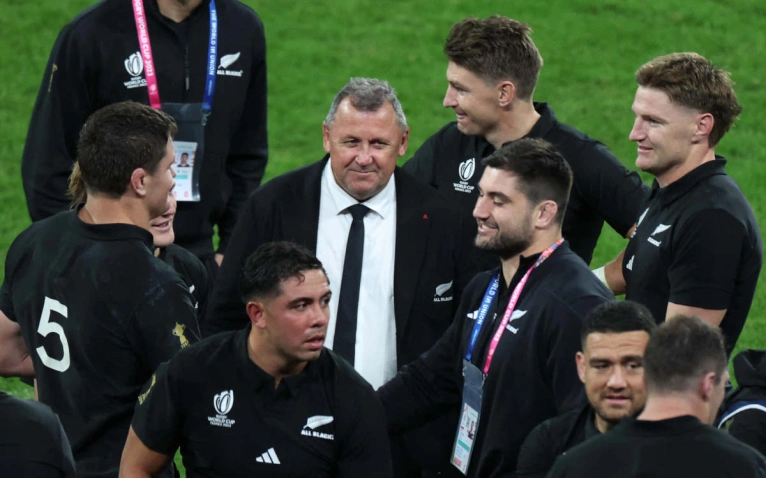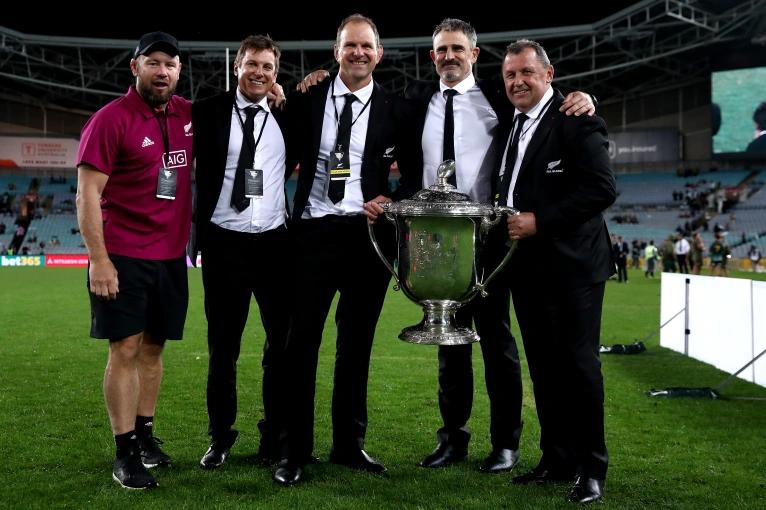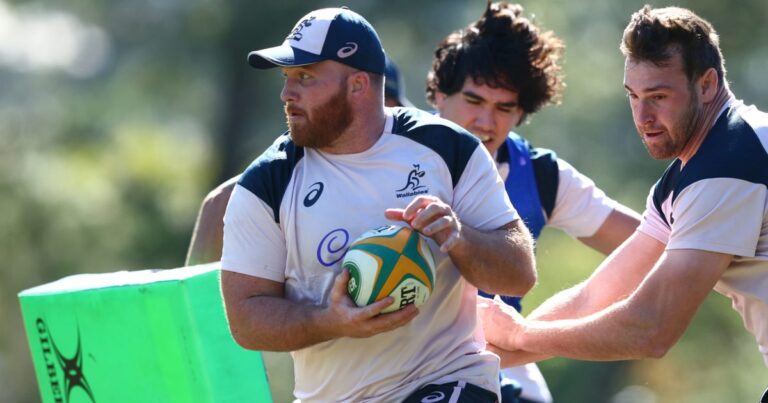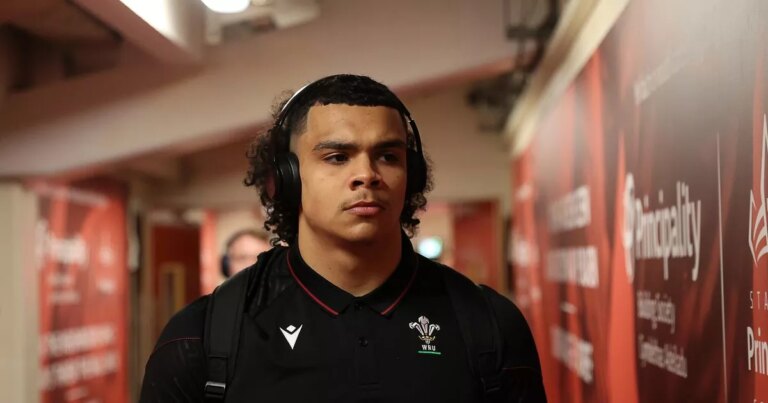
It won’t ever stop being an obsession in New Zealand to evaluate the reigns of the various All Blacks coaches and to compare them against one another. Focusing only on those who have coached in the professional era, it has not been that hard to build a sense of who sits at the top of the pecking order.
Steve Hansen sits at the top as his win record of 87 per cent is the highest and his tenure also includes victory at the 2015 World Cup. Graham Henry wouldn’t be far behind after winning 85 per cent of his tests and the 2011 World Cup.
John Mitchell and John Hart both had their All Blacks teams playing exhilarating rugby at times –but the former had a strange relationship with the media and public and the latter, having seen his All Blacks lose just once in a two-year period in 1996 and 1997, went five losses on the bounce in 1998 to somewhat taint his time in charge.
When Ian Foster finished up with the All Blacks in 2023, he had a win record of 71 per cent that included an historic first defeat to Argentina, a home series loss to Ireland and an unprecedented decision to sack two assistant coaches.
There were many who felt Foster himself was fortunate not to have been sacked midway through his tenure and that his four years at the helm were among the least impressive of any coach in the professional period.

But now that Foster has published a memoir of his time in office – Leading Under Pressure – and thrown light on what was happening behind the scenes between 2020 and 2023, there’s an entirely new context within which to frame his tenure.
It’s unlikely that any other All Blacks coach has ever faced the same number of distractions, obstacles and dramas that Foster did – and the volume of interference and he encountered not only creates an intriguing and at times explosive narrative, it also provides cause to see him as a more effective head coach than his record alone suggests.
The problems Foster faced began even before he got the job in December 2019, because the process to get him in there was so drawn out that it saw him lose both Jamie Joseph and Tony Brown from his preferred coaching team.
New Zealand Rugby had asked candidates to present with full coaching teams in place, but by the time it got round to interviewing candidates, Joseph and Brown had opted to re-sign with Japan.
Not being able to secure Joseph and Brown left Foster scrambling for alternatives in a relatively shallow pool of talent and he opted for John Plumtree and Brad Mooar – two coaches who were not necessarily All Blacks calibre.
“Not being able to secure him [Joseph] did change the dynamic of my team,” Foster says in Leading Under Pressure.
“It meant there was no chance of getting Brownie either, and so, relatively late in the piece, two high-quality coaches with international experience were taken off the table.
“It inconvenienced me, but I felt the real loss was to the All Blacks. Those two men had a lot to offer as coaches, and my love of the All Blacks is such that I wanted the best people to be on the team.”
Not being able to secure Joseph and Brown left Foster scrambling for alternatives in a relatively shallow pool of talent and he opted for John Plumtree and Brad Mooar – two coaches who were not necessarily All Blacks calibre but who he considered the best available at the time.

If it wasn’t tough enough starting his role with a coaching team he’d pieced together at the last minute and one that wasn’t his initial choice, New Zealand shut its borders in March 2020, killing Super Rugby as everyone knew it and forcing a longer-term radical restructure of cross-border competitions.
But while this part is well-known, Foster reveals in his book, that the arrival of the pandemic – which meant NZR lost $34 million in 2020 – saw him come under pressure to make All Blacks coaching and management staff redundant before a test had even been played on his watch.
Foster saved jobs by persuading his coaching and management to take massive pay cuts – his own one being significantly more severe than anyone else’s.
And then, on the morning of the first test of his tenure in October 2020, Foster was told by chief executive Mark Robinson that neither he nor any of his coaching staff would find out until December 2021 whether their contracts that ran until December 2021 would be extended or not.
Foster had an incredibly tough first year, but he doesn’t absolve himself of responsibility for the poor record the All Blacks posted – three wins, two defeats and a draw – and he is particularly honest about the historic first loss to Argentina.
This was a significant departure from the norm, and Foster’s surprise was two-fold – that such a bad decision had been made – he felt it would lead to coaching staff quitting in the middle of 2021 to find jobs elsewhere – and that this bad news was being delivered just hours before the first test of his tenure.
As Foster says in the book: “I went back to my hotel [after the meeting with Robinson] fuming, thinking about how much the coaching and management group had sacrificed, and what compromises we’d all made to mitigate the impact of the pandemic.
“What we needed right now – on the morning of our first Test match of the year – was reassurance and support. We needed to know that our employer understood the stress we’d endured in the unique circumstances of 2020.”
Foster had an incredibly tough first year, but he doesn’t absolve himself of responsibility for the poor record the All Blacks posted – three wins, two defeats and a draw – and he is particularly honest about the historic first loss to Argentina.

“I take responsibility for not preparing us well enough to deal with what we knew was coming. It became a pivotal game in the World Cup cycle, because it gave other teams a simple formula to implement against us, one based on slowing our ball down at the breakdown, putting us under pressure with defensive line-speed and high tackle accuracy, and generally frustrating us.
“This approach brought out the worst in us.”
His second year wasn’t much easier as the All Blacks had to spend 15 weeks on the road to play their last 10 Tests, and Foster delves into the finer detail of what taking 41 players overseas for so long entailed at a time when New Zealand’s border was shut and players couldn’t return home for injury or any other reason until their allocated slot was available in the government’s managed quarantine facility.
The All Blacks won seven from 10 on that tour – a return that saw Foster heavily criticised. But the difficulty inherent within that tour – which included two encounters with South Africa before facing Ireland and France in the last two games – was never fully appreciated by the media.
He [Foster] doesn’t use his memoir to throw Plumtree and Mooar under the bus, but he details how the team was consistently failing in areas under their respective jurisdiction, and how he was left with no choice but to sack them.
As Foster details, he decided to prioritise player welfare to ensure that everyone in the 41-man party had game time, because he feared that if some players spent weeks just training, mostly staying in their rooms due to the Covid protocols and not getting a chance to play, then there could have been mental health breakdowns throughout the squad.
It was a move that won him the respect of his players for the way he communicated his intentions and recognised the duty of care element such a tour presented.
“We wanted everyone to know that they were going to play at some stage, but we couldn’t afford for that to morph into a sense of entitlement – that they were due an opportunity just by being there,” he says in Leading Under Pressure.
“Our goal was to use the possibility of game time to generate excitement among the entire group: to let everyone know they were going to play at some stage but to keep them guessing about when that would be.”
But as is well-documented, the issues compounded in 2022. Having finished the 2021 season with back-to-back defeats to Ireland and France – losses that were perhaps illustrative of the stress and fatigue imposed by an impossibly long tour but defeats which Foster says were a result of his team not being on the same level as the European giants – three more would come in the first four tests of 2022.
He doesn’t use his memoir to throw Plumtree and Mooar under the bus, but he details how the team was consistently failing in areas under their respective jurisdiction, and how he was left with no choice but to sack them.

He also details how there was a growing split between the All Blacks and NZR – one that intensified when the CEO of the latter published a statement after the series loss to Ireland in July branding the performances, “unacceptable”.
By the end of the book, it’s impossible not to wonder what his tenure might have looked like had Joseph and Brown been secured at the start and had there been more support from his employer.
Because what comes through, courtesy of player testimony that is included in the narrative, is that once Jason Ryan and Joe Schmidt joined the coaching team after the Irish series in 2022, the All Blacks were a different team, and Foster a different coach.
His record was played 24, won 15, lost eight drew one pre-Ryan and Schmidt, and it was played 21 won 16, lost four, drew one with them.
But they also made the World Cup final in 2023 and came within a whisker of winning it and when the whole of Foster’s tenure is considered against the backdrop of what he faced, it’s still difficult to know where he sits against his peers, but higher than it initially appeared.




